
##Update (Sep. 16): Premiere delayed. New time will be announced shortly.
Keynote Speech 3: Sunday, September 18th, 2022 || 9:00-9:45 Arizona Time
Keynote Speaker: Academician Ovid Jyh-Lang Tzeng
Professor Ovid Tzeng is an outstanding researcher in Cognitive Neuroscience and Neurolinguistics and an experienced leader in academic institutions. He was the chancellor of University System of Taiwan, the Minister of Education, the Minister Without Portfolio, and the Minister of Council for Cultural Affairs. He serves as a member of the Board of Directors of Haskins Laboratories in the U.S. and an advisory board member of the ARC Centre of Excellence in Cognition and its Disorders in Australia. He has also been elected to be the academician of The World Academy of Sciences (TWAS) since 2010 and active member of The European Academy of Sciences and Arts since 2017. He had been the Chancellor of University System of Taiwan for several years, which was created by him and established to oversee and integrate the research and teaching developments of Taiwan’s four top research universities. Prior to the Chancellorship, he was the Vice President of Academia Sinica for international affairs. He is currently an Executive member of the Committee on Human Rights of the NAS, NAE, and NAM, as well as a member of the UNESCO’s Inclusive Literacy Learning for All Project.
Title of Speech: Cognitive Wellbeing in the Digital World: The Future is Now!
In 1850, average life expectancy at birth for London Victorians was 41. Now, in 2022, average Londoners’ life expectancy is 81.65. In Taiwan, it is 80.87, comparable to other industrialized countries. Over 172 years, people doubled their life expectancy as the world became increasingly complicated with respect to both social and physical living conditions.
Are we happier than those whose earth living experience is 40 years less than ours? How to define cognitive wellbeing in the modern world in which everyday living is built upon fast-changing and increasingly more complicated 10-Os (Astro, Bio/Ecolo, Geno, Neuro, Cogno, Techno, Info/Digito, Econo, Medico, and Culturo/Socio) Knowledge? Medicare for all people today is undoubtedly much advanced with respect to disease diagnosis and treatments. However, health-care for the elderly nowadays is not about guaranteeing immortality, rather, it is concerned with how to stave off the diseases of old age that we must face at the end. Thus, cognitive wellbeing should be defined in terms of conditions that ensure old age is enjoyed and not endured. Otherwise, who wants to extend lifespan if all that means is another 40 years of ill health?
Strictly speaking, the goal of emphasizing cognitive wellbeing is about increasing healthspan, not lifespan. For sure, we are living longer and longer already. But many old people are suffering from disability and lost of quality of life due to aging. As powerful computation is brought to bear on biology, psychology, cognitive neurosciences, and cyber engineering, we should be able to detect human ailment before it happens by arranging human intervention. Examples of experimental studies and their results along this line of thinking will be provided in the presentation.
Closing Ceremony: Sunday, September 18th, 2022 || 11:45-14:30 Arizona Time
Chair:
Hsi-Yuan Chen (CEO of PNC & Director, Academia Sinica Center for Digital Cultures (ASCDC), Academia Sinica, Taiwan)
Speakers:
Hsinchun Chen (Regent Professor, Thomas R. Brown Chair of Management and Technology, Director and founder of the Artificial Intelligence Lab (AI Lab), Eller School)
Albert Welter (Head, Department of East Asian Studies, University of Arizona, USA)
Prof. Lewis Lancaster 90th Birthday Celebration Remarks
Ruth Mostern (Director, World History Center and Professor, Department of History, University of Pittsburgh, USA)
Announcement of Poster Competition Winner by
Jieh Hsiang (Director and Professor, Research Center for Digital Humanities, National Taiwan University, Taiwan)
Hai Ren (Professor, East Asian Studies; Anthropology; Applied Intercultural Arts Research; Social, Cultural & Critical Theory; Gender & Women’s Studies, University of Arizona, USA)

